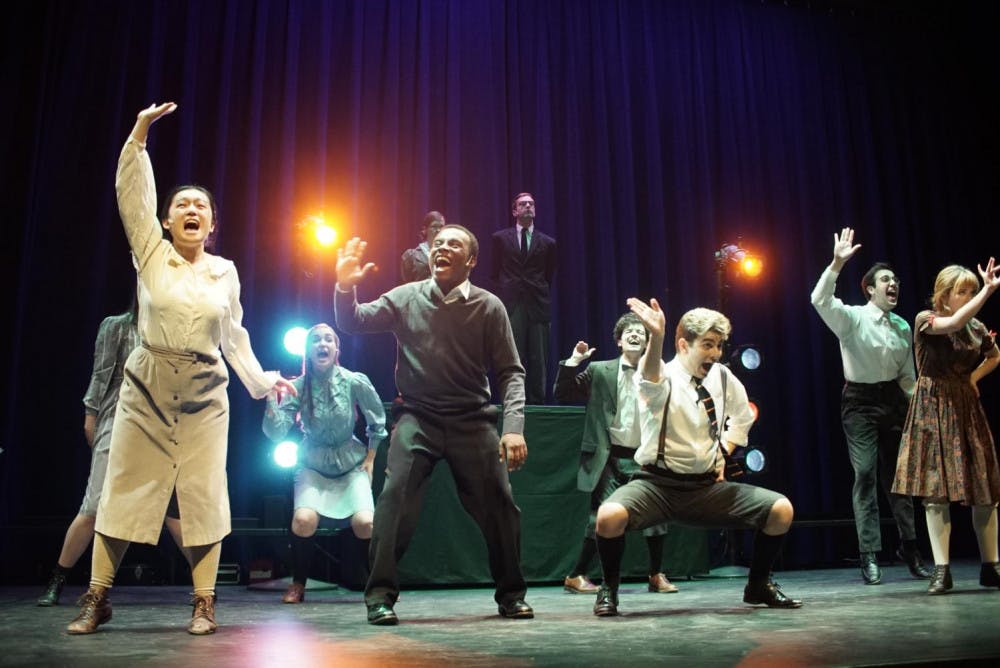On Thursday April 12 through Saturday April 14 the Middlebury College Musical Players Club performed “Spring Awakening” at the Town Hall Theater. The production, which focuses on the sexual frustration and the overall disillusionment with society that a group of teenagers experience in nineteenth19th -century Germany, was entirely student run: everyone from, as the director to members of the pit orchestra are all students at the College.
The play’s central themes are the angst that is created when misunderstood, ignored, young people are misunderstood and ignored and what happens when they become aware of the issues in the society that they take part in.
Director Olivia Christie ’19 said that the play is about the times “in every young person’s life where they start learning things that will absolutely and forever change who they are.”
These young people are dealing with that awkward and tense part of their lives where they constantly feel they are on the brink of new life experiences. The play opens with Wendla, played by Haley Goodman ’21, asking her mother how women can get pregnant. Her mother evades the question and tells Wendla that a woman can only get pregnant if she is in love with her husband. This scene sets up the entire play in its demonstration of the stark division between adult figures and curious children. Arguably, this interaction and lack of information for Wendla causes the serious turn of events that affect many of the characters throughout the play and highlights the importance of honesty and respect between parents and children.
Other problems that the characters face are the crippling pressure of standardized schooling and demands of teachers and administrators for children to perform to a prescribed level. Audiences are made to sympathize with the characters as they struggle to accept and learn about themselves while they are failing in academic settings and, as explained to them by their parents, damaging their families’ reputations.
The play also sheds light onto stories of abuse in its many forms. The audience learns that no one knows the details of what happens behind closed doors in this small town. The children are forced to face thisese fact,s and it causes them to question the authority and simplicity of life that they have come to know.
The division between adults and children is highlighted in many ways in this play, as the disparity and lack of understanding between the two is what causes many of the children’s problems. Their feeling of being alone and ostracized by the adults in their lives is a relatable problem, both when the play was written in 1891 and today.
All of the adults are played by two actors, Daniel Fulham ’21 and Paige Guarino ’18.5. This choice demonstrates the fact that all adults in this society treat the children in very similar ways. The children are separated on multiple fronts from their parents and their teachers and while that causes them to feel lost, it does allow for deep bonds between them and their peers.
While this play deals with suicide, abuse, death, sexual frustration and the questioning of identities, the audience is given the opportunity to grapple with these problems through the beauty of the music. These topics are at times dark and harrowing, but the music and choreography allows for expression of these ideas in a manner that demonstrates the gravity of these situations while adding the youthful energy that lies in each of the characters.
“Spring Awakening” tells the story of children coming into an adult world that is often inhospitable and unknown to them. The trials that these characters are forced to experience demonstrate how the ways in which adults try to shield and protect children often place them in situations that put them further in harm’s way.
Through the troubles of these children, audiences can see the ways in which people of all ages can help young people make the transition from ignorant bliss of youth to awareness in adulthood. Overall, this play shines a light on the resilience of children in the face of the mysterious and corrupt adult world and how we can all do better as a society bringing children and teenagers into a world that is welcoming for them.
“Spring Awakening” Sheds Light on Dark Times for Children

Comments



